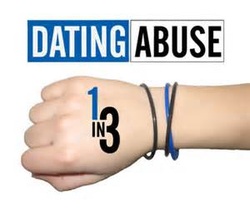Teen Dating Violence: The Basics

* 1 in 3 girls who have been in a serious relationship say they've been concerned
about being physically hurt by their partner.
* 1 in 5 teens who have been in a serious relationship report being hit,
slapped or pushed by a partner.
* In a study of gay, lesbian, and bisexual teens, youths in same-sex
relationships are just as likely to experience dating violence as youths
involved in opposite sex dating.
* Adolescent girls in physically abusive relationships were 3.5 times more
likely to become pregnant than non-abused girls.
Dating abuse (also known as intimate partner abuse) is a pattern of controlling behaviors that one partner uses to get power over the other. It includes:
People know that dating violence has a negative effect on the victim and the longer the abuse continues the more negative the effects and the harder it is to get away. Talk to a counselor, teacher, parent or trusted friend. Remember, you are not alone and help is available.
about being physically hurt by their partner.
* 1 in 5 teens who have been in a serious relationship report being hit,
slapped or pushed by a partner.
* In a study of gay, lesbian, and bisexual teens, youths in same-sex
relationships are just as likely to experience dating violence as youths
involved in opposite sex dating.
* Adolescent girls in physically abusive relationships were 3.5 times more
likely to become pregnant than non-abused girls.
- 40% of teenage girls, ages 14 to 17, known someone their own age who has been hit or beaten by their partner.
- 80% of girls who have been physically abused keep dating their abuser.
- 1 in 4 teenage girls in relationships say they have been pressured to perform oral sex or have sex when they don't want to.
Dating abuse (also known as intimate partner abuse) is a pattern of controlling behaviors that one partner uses to get power over the other. It includes:
- Any kind of physical violence or threat of physical violence to get control
- Emotional or mental abuse, such as playing mind games, making you feel crazy, yelling at you, or constantly putting you down or criticizing you
- Sexual abuse, including making you do anything you don’t want to do, refusing to have safe sex or making you feel badly about yourself sexually
People know that dating violence has a negative effect on the victim and the longer the abuse continues the more negative the effects and the harder it is to get away. Talk to a counselor, teacher, parent or trusted friend. Remember, you are not alone and help is available.

Sources:
Do Something
Cycle of Violence
National Center to End Domestic Violence
Do Something
Cycle of Violence
National Center to End Domestic Violence
